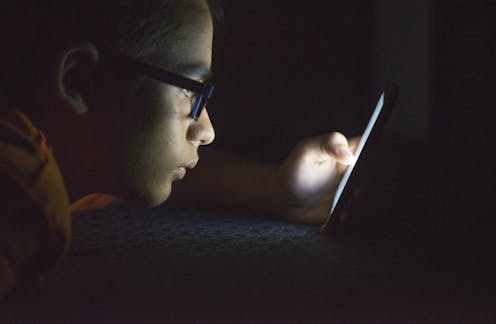
The Research Brief is a short take about interesting academic work.
The big idea
Online racial discrimination or harassment has a negative effect on the academic and emotional well-being of students of color. That is the key finding from a study I published recently in the Journal of Youth and Adolescence.
For the study, I surveyed 356 Black and Hispanic teens across the U.S. I analyzed their responses to questions about their social media use and experiences. I also asked about their mental health and beliefs about their academic potential. The adolescents were 16 years old on average.
Girls in this study had on average one to three more social media accounts than boys. Girls reported depression levels that were four points higher than those of boys. This suggests more depressive symptoms among girls. Black teens reported social media activity that was three points greater than that of Hispanic teens. They also reported more online experiences of discrimination – almost 10% more – than their Hispanic counterparts.
Black and Hispanic teens who used social media more were more likely than not to encounter online racial harassment or discrimination, whether as direct victims or observing their racial group or another racial group being demeaned or discredited. Brendesha Tynes, a researcher at the University of Southern California, describes online discrimination as “disparaging remarks, symbols, images, behaviors that inflict harm through the use of computers, cell phones and other electronic devices.”
Additionally, students who observed more online racial harassment or discrimination suffered more depression and anxiety than those with fewer of these negative online experiences. Higher levels of depression and anxiety undermined Black and Hispanic adolescents’ confidence in their academic abilities.
Students didn’t experience more depression and anxiety only when they personally, or members of their own racial or ethnic group, were targeted. They also experienced more depression and anxiety when they observed other people and racial or ethnic groups being targeted.
Why it matters
When teens encountered online discrimination during their social media use, they had fewer positive beliefs about their academic skills. This is noteworthy, because if it weren’t for this discrimination, teens who use social media often had more positive perceptions of their academic skills and abilities than those who used less social media.
Online racial discrimination and harassment represents a unique risk for teenagers of color. Not only are they more likely to see and post more race-related content, but when this race-related content is negative it has harmful effects on their mental health, academics and overall behavior.
If society has a better understanding of how online racial discrimination and harassment affects teenagers’ mental health and academic well-being, then schools, parents and youth agencies could be better able to help reduce the harm.
What other research is being done
My lab and other researchers are conducting studies to determine other effects that online harassment may have on young people of color. For instance, I am currently exploring whether these negative online experiences may influence young people to engage in social and political activism. This includes protests, voting, canvassing, writing to legislators and community organizing.
Alvin Thomas does not work for, consult, own shares in or receive funding from any company or organisation that would benefit from this article, and has disclosed no relevant affiliations beyond their academic appointment.
This article was originally published on The Conversation. Read the original article.







